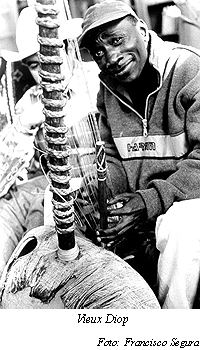 |
Like many immigrants, Senegalese musician Vieux Diopcame to America to "experience new things. I wanted to come over, see the U.S., and try my luck."
But when Diop, who has just released Afrika Wassa (Triloka), arrived in New York in 1983, he discovered that "African music and culture was really not known. I remember that if you went out in African clothes, people would look at you and wonder why you were wearing pajamas."
Meeting some other Senegalese, he began playing his harp-like kora with them, and made ends meet by teaching language classes. Although music was his focus, it took 11 years before he issued his first album, the Caribbean-flavored Deeso, followed in 1995 by Vieux Diop (Vieux Jo).
During that decade, American ears began to open up to people like Baaba Maal and Salif Keita, and Diop's old friend, Youssou N'Dour. Diop, whose real name is Alioune (Vieux, meaning old, is a nickname from his grandfather), and N'Dour had started out playing and recording together in Dakar's Star Band when they were teenagers, with Diop behind his first instrument, a drum kit.
"Walking down the street and hearing yourself on the radio was really something," he recalled. But he had to keep his fame hidden from his father, who disapproved of Diop's musical career. It reached the point where "we were on TV playing, and I had to hide my face. I knew if my father saw me, he was going to get me! And he did."
The pair did eventually reconcile, and these days, Diop, now in his 40s, makes a living from his instrument. He's worked as an outreach artist through the famous Juilliard School of Music, introducing thousands of kids in New York City public schools to African music, and he still performs regularly in high schools and colleges around the country, as well as at Disney World in Florida.
His own music, however, reflects almost 20 years of living in a cultural blender, rather than anything traditionally Senegalese. Guests like Celtic fiddler Eileen Ivers add their own flavor to the stew, as on the spiritually uplifting "C On." But the heartbeat remains ineffably Diop's.
"Since I've lived in the U.S. for so long, I wanted to do something different," he explained. "My music has people from many different backgrounds, all putting their sound in, and it becomes one. But when you listen to it, there's still that African thing under it all; you can feel it. But it's for everybody to enjoy. This is a melting pot, everybody has something to offer."
And on pieces like "Sing Lo-Lo," where kalimba mixes with synthesizers, guitar, and even turntables, he seems to have captured the mix of America on disc.
For the future, Diop said, "I can't say I have a plan. It's going to be sharing my culture and traditions." But the last 17 years in have brought him to the point where "whatever I'm doing in life, I'm doing sincerely. In music you always have to be honest with yourself."
|
|